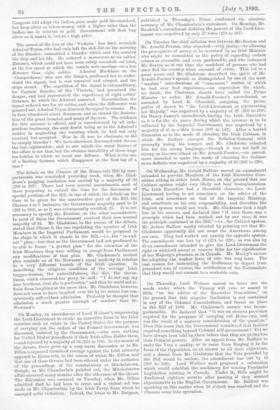On Thursday, Lord Wolmer moved to leave out the words
under which the Viceroy will veto or assent to Bills "on the advice of the Executive Committee," on the ground that this singular limitation is not contained in any of the Colonial Constitutions, and found no place in the Bill of 1886. Mr. Gladstone's answer was incom- prehensible. He declared that "it was an obvious provision required for the purposes of carrying out Home-rule, and was the result of a maturer consideration of the question." Does this mean that the Government considered that Ireland required something beyond Colonial self-government ? Yet we have always been told by(them before that they are giving less than Colonial powers. After an appeal from Mr. Balfour to make the Veto a reality, or to cease from flinging it in the faces of the Opposition, as an answer to all their objections, and a denial from Mr. Gladstone that the Veto provided by the Bill would be useless, the amendment was lost by 42 (290 to 248). Lord Wolmer next proposed a subsection which would establish the machinery for vetoing Provincial Legislation existing in Canada. Under it, Bills might be disallowed eighteen months after passing if they seemed objectionable to the English Government. Mr, Balfour was speaking on this matter when 10 o'clock was reached and the Closure came into operation.


































 Previous page
Previous page